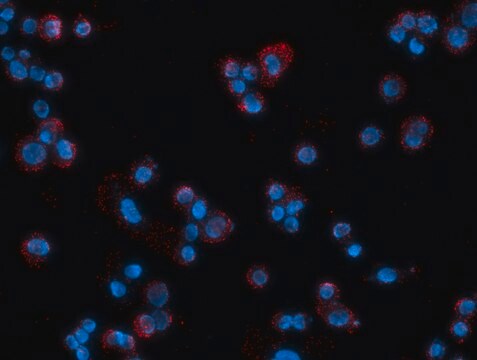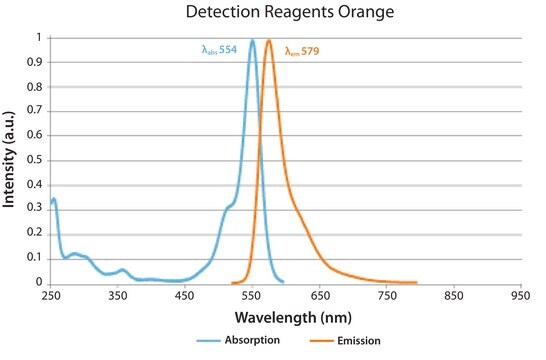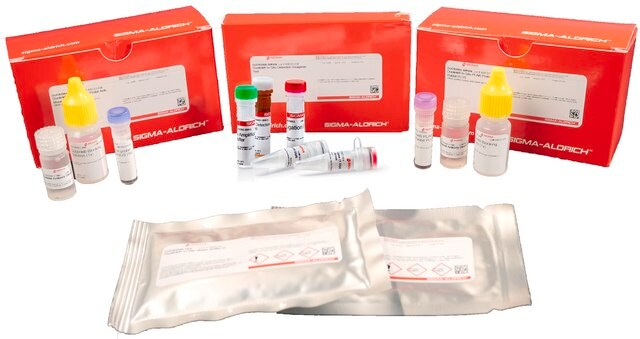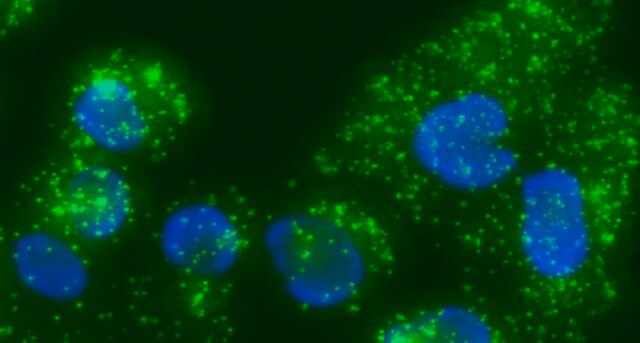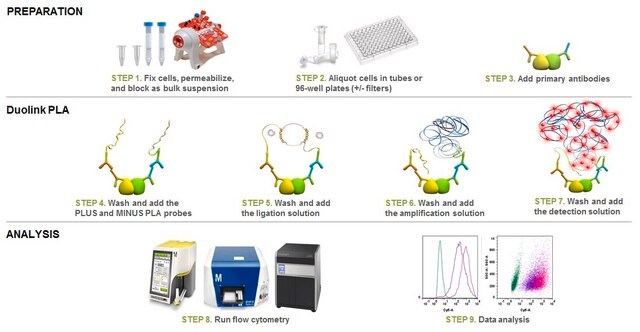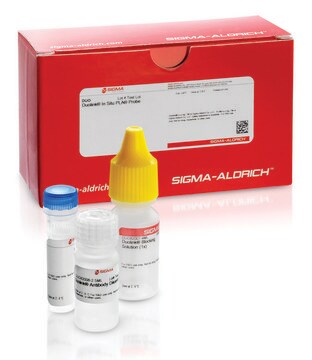DUO94102
Duolink® flowPLA Mouse/Rabbit Starter Kit - Green
Duolink® PLA kit for Flow Cytometry with Green Detection and Mouse/Rabbit probes
Synonym(s):
in situ Proximity Ligation Assay, Flowcytometry-PLA, Protein Protein Interaction Kit
About This Item
Recommended Products
Quality Level
technique(s)
flow cytometry: suitable
immunofluorescence: suitable
proximity ligation assay: suitable
fluorescence
λex 495 nm; λem 527 nm
suitability
suitable for fluorescence
storage temp.
−20°C
Related Categories
Specificity
Use appropriate laser for λex 495 nm excitation.
Use appropriate filter for λem 527 nm emission.
Application Note
Primary antibodies are needed. Test your primary antibodies (IgG-class, mono- or polyclonal) in a standard immunofluorescence (IF), immunohistochemistry (IHC), or immunocytochemistry (ICC) assay to determine the optimal fixation, blocking, and titer conditions. Flow validated antibodies are recommended.
Let us do the work for you, learn more about our Custom Service Program to accelerate your Duolink® projects.
View full Duolink® product list
Application
Duolink® flowPLA Starter Kits will enable sensitive detection of proteins, protein-protein interactions, and protein modifications within cell populations by flow cytometry. To perform a Duolink® flowPLA experiment, you will need fixed, suspended cells, two primary antibodies that specifically recognize your proteins of interest and the Duolink® flowPLA starter Kit. The flowPLA Starter Kits are available with 3 different fluorophores: Violet, Green, and FarRed. The flowPLA starter Kits contain all the necessary reagents reagents for 100 Duolink® PLA reactions, including a pair of PLA probes (Anti-Rabbit PLUS and Anti-Mouse MINUS) and all the reagents to perform the amplification and detection of bound PLA probes by flow cytometry. Analysis is carried out using standard flow cytometry assay equipment. User must provide a fixed cell suspension, (rabbit and mouse-raised) primary antibodies, and corresponding PLA Probes.
Follow the Duolink® PLA Flow Cytometry Protocol to use this product.
Visit our Duolink® PLA Flow Cytometry page on how to run a Duolink® flow experiment, applications, troubleshooting, and more.
Features and Benefits
- Analyze protein protein interactions with flow cytometry readout
- Analyze cell populations with Proximity Ligation Assay
- Increased sensitivity due to rolling circle amplification for low abundant targets
- No overexpression or genetic manipulation required
- Relative quantification possible
- Works with any flow cytometer instrumentation
- Easy to follow flexible protocol
- Publication-ready results
Components
Duolink® In Situ PLA™ Probe Anti-Mouse MINUS DUO92004-40TST
Duolink® In Situ PLA Probe Anti-Rabbit PLUS DUO92002-40TST
Duolink® In Situ Wash Buffer, Brightfield (DUO82047-4L)
See datasheet for more information.
Legal Information
PLA is a registered trademark of Sigma-Aldrich Co. LLC
Signal Word
Danger
Hazard Statements
Precautionary Statements
Hazard Classifications
Aquatic Chronic 2 - Resp. Sens. 1 - Skin Sens. 1
Storage Class Code
10 - Combustible liquids
Certificates of Analysis (COA)
Search for Certificates of Analysis (COA) by entering the products Lot/Batch Number. Lot and Batch Numbers can be found on a product’s label following the words ‘Lot’ or ‘Batch’.
Already Own This Product?
Find documentation for the products that you have recently purchased in the Document Library.
Articles
General tips and tricks for proper experiment execution, aid in identifying potential problems, and provide solutions to ensure a successful Duolink® PLA experiment for flow cytometry.
Traditional flow cytometry has been limited in the ability to detect protein-protein interactions and low abundant proteins events — until now. We have combined Duolink® Proximity Ligation Assay (PLA) with flow cytometry in a convenient kit, making the analysis of protein-protein interactions with flow cytometry readouts a reality.
Protocols
Protocol for use of Duolink® PLA reagents for the detection of individual proteins, protein modifications, and protein-protein interactions within cell populations by flow cytometry.
Our team of scientists has experience in all areas of research including Life Science, Material Science, Chemical Synthesis, Chromatography, Analytical and many others.
Contact Technical Service